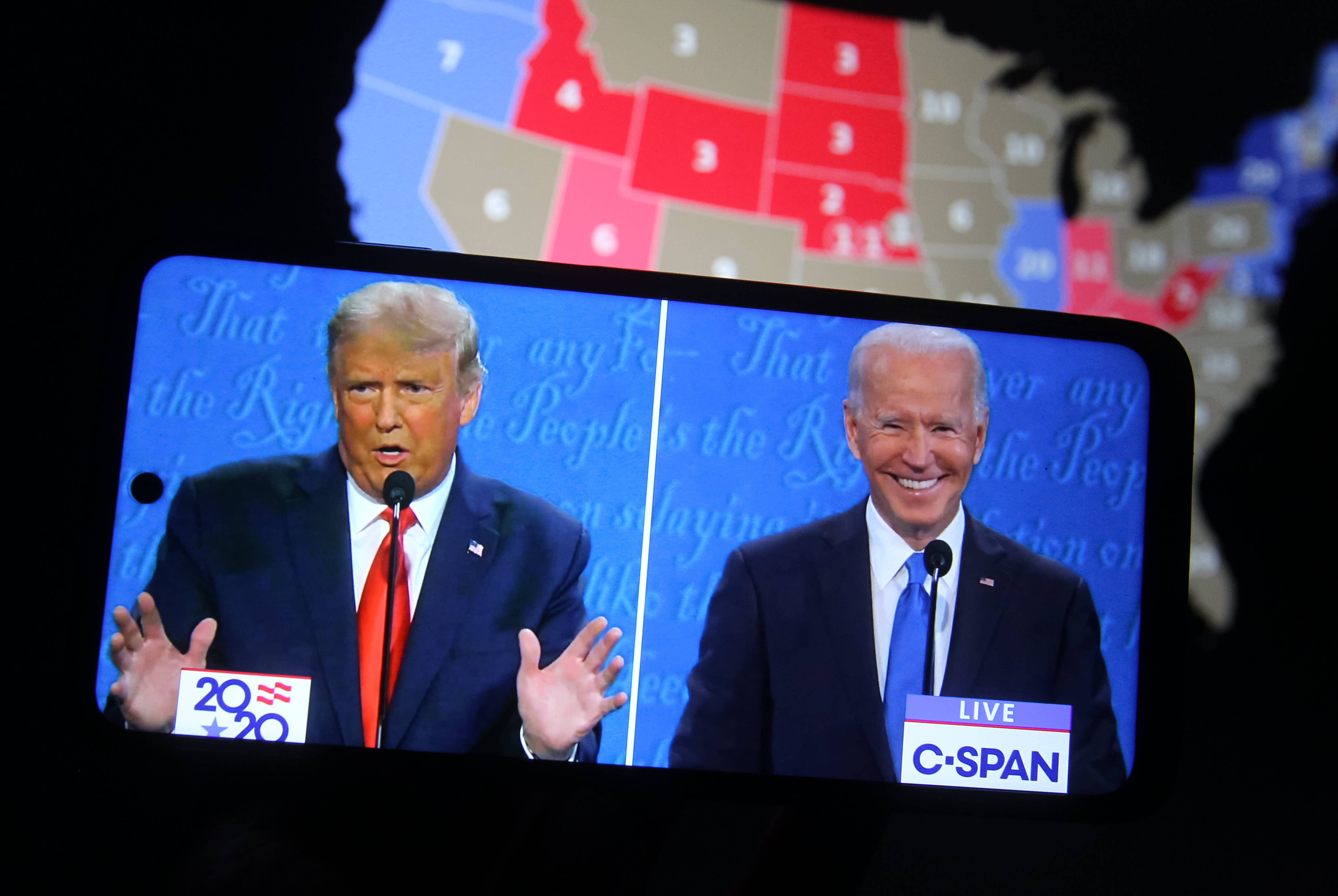
In this photo illustration the US President Donald Trump and Democratic presidential candidate and former US Vice President Joe Biden are seen during the final presidential debate displayed on a screen of a smartphone.
Pavlo Conchar | LightRocket | Getty Images
Former Vice President Joe Biden holds an 11-point lead over President Donald Trump one week before the election, but the CNBC All-America Economic Survey shows there remain ways for the race to tighten.
Biden leads President Donald Trump 51% to 40%, a two-point increase from the June poll and six points better than April. The poll of 800 registered voters nationwide found the President’s overall approval rating remains negative by 11 points at 42-53%, around the average of his presidency.
The president also has lost his long-standing positive approval rating on handling the economy for the second survey in a row, with Americans now evenly split at 47%.
The poll, with a margin of error of +/-3.5%, found that Biden has drawn even with President Trump in support from senior citizens and white women, two groups the President won in 2016. But it also shows a substantial part of Biden’s lead drawn from new voters and young voters, two groups whose turnout has long been suspect in elections.
“It comes down to the younger voters and the non-2016 voters,” said Jay Campbell, partner at Hart Research Associates, who served as the Democratic pollster on the survey. “If they do not turn out in substantial numbers, that makes the entire election a ton closer.”
For President Trump, the election appears to boil down to his ability to dig deeper into the ranks of his unshakeable, but so far unexpandable, base of 40% of voters. If President closes the gap, “it’s because he’s changed the composition of the electorate in such a way that he’s driving turnout among white non-college grads and probably in the Midwest and in rural areas in swing states,” said Micah Roberts, partner with Public Opinion Strategies, who served as the Republican pollsters for the survey.
The poll was conducted Wednesday through Saturday, with two days of polling coming after the presidential debate.
A ranking of the issues by voters shows the President’s task is difficult. Voters chose health care and handling the pandemic as the top two election issues, two issues where voters break for Biden. The economy and law and order were next, issues that break for President Trump. Voters also ranked the candidates’ “personal character and integrity” as a top issue. Those responding that it was their most important issue favored Biden by 66% to 29%.
Three of the least important issues — taxes, immigration and relations with china — are most critical to Trump voters. Climate change, a top issue for Biden, also ranks low on the list.
President Trump goes into this election with his economic approval rating at an even 47%. That’s well below his best days in June 2018, when his net approval (approval minus disapproval) was positive 15. But it’s better than his worst rating in Sept. 2019 when he was minus 8 points. Still, voters who rate the nation’s economic situation as the top issue favor President Trump 48-38%.
Americans by a wide margin judge President Trump as best for the stock market. Forty-five percent say the market will be a higher a year from now if he is reelected compared to just 32% for Biden. And 23% say it will go up a lot, compared to just 8% who say so for Biden. In fact, 18% of Biden’s supporters believe the market will go up under Pres. Trump compared to 7% of Trump voters who believe it will rise under Biden. Overall, American’s views remain modestly positive on the stock market, with 41% saying it’s a good time invest and 35% saying it’s a bad time.
A plurality of 47% of the public say they are better off financially then they were four years ago, with 35% saying they are about the same and 17% saying worse. Wealthy Americans, those with money in the stock market and Trump supporters are among those most likely to answer they are better off.
The current assessment of the economy picked up a bit, but remains below the pre-COVID levels. Thirty-six percent judge the economy now as excellent or good, up seven points from the June survey; 62% say it’s just fair or poor, down six points. When it comes to the economic outlook, 47% believe the economy will improve in the next year, down four points from June. At the same time, the percent who said the economy will get worse declined to 15% from 23%. The reason: Americans are expressing more uncertainty than ever on the outlook, with 18% saying they are unsure if the economy will get better or worse in the next year. It was last this high before the 2016 election.
With a strong housing market in many parts of the country, Americans’ views on home values continue to improve. The percent of Americans saying they expect their home values to increase had fallen to 24% in April amid the worst part of the COVID economic downturn. It’s now bounced back to 42%, about average for the series.




